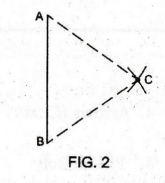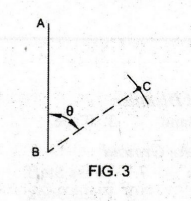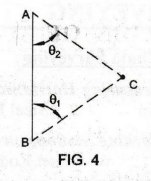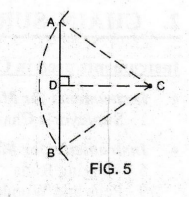Basic Civil & Mechanical Engineering: UNIT II: a. Surveying
Principles of surveying
The basic principles by which various surveying methods carried out are as follows:
PRINCIPLES OF SURVEYING
The
basic principles by which various surveying methods carried out are as follows:
1. Working from 'The Whole to the Part
To
survey a vast area such as a town, first a system of Control Points is
established to form the boundary lines
of the area. The control points may be established by triangulation or by
running a traverse surrounding the area. Then, the main triangles and traverses
are broken into smaller ones and measured.
2. Location of a New Point by at least Two Independent Processes
The
use of two independent processes to locate a new point helps in taking one set
of measurements (linear or angular) from one process. The same is checked by
another set of measurements. Using this principle, first two reference points
(called Control Points) A and B are chosen on the ground. The distance AB is
measured. The required point C is located by making measurements using any one
of the following Direct Methods:
(i).
By measuring the distances AC and BC: See Fig. 2. In
this method, the linear measurements AC and BC alone are measured. Distance AB
is known. Locate C by drawing arcs from A and B with the radii AC and BC
respectively. This method is used in Chain Surveying.

(ii)
By measuring the distance BC and the angle ABC:
See Fig. 3. In this method, both linear and angular measurements are made. The
distance BC and the included angle ABC (0) are measured. AB is known. Locate C
by drawing an arc of length BC on the line drawn from B with the angle 0. This
method is used in Traverse Survey.

(iii)
By measuring the included angles ABC and BAC: See
Fig. 4.

In
this method, angular measurements alone are made. The included angles ABC (01)
and BAC (02) are measured. Locate C by the intersection of the two angular
lines drawn from B and A with angles Oand O2 respectively. This method is used
in Triangulation.
(iv)
By drawing a perpendicular from C on AB:
See
Fig. 5.

In
this method, a linear measurement alone is made, though it involves the angular
measurement (i.e., 90°) for perpendicularity. This perpendicular from C on AB
is drawn using cross-staff or swinging the tape along AB. After fixing D on AB,
measure AD or BD and CD. Locate C by drawing an arc from D on the perpendicular
drawn from D with the length CD. This method is used in Chain Surveying.
Basic Civil & Mechanical Engineering: UNIT II: a. Surveying : Tag: : - Principles of surveying
Related Topics
Related Subjects
Basic Civil and Mechanical Engineering
BE3255 2nd Semester 2021 Regulation | 2nd Semester EEE Dept 2021 Regulation
